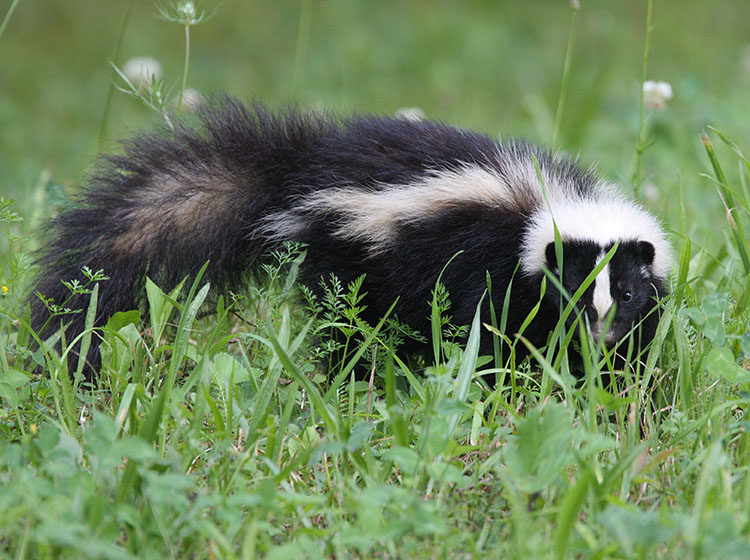Skunks were previously thought to be members of the Mustelidae family which includes weasels, mink, fishers, and otters. However, they recently (as of August 31, 2022) have been changed to the Mephitidae family after the word meaning “stink”. The two members of the skunk family in Pennsylvania are the spotted skunk (mostly in southcentral Pennsylvania) and the striped skunk, which is the most common species.
| Appearance | Skunks have small heads and faces with wider rear ends. Their fur is primarily black, with white striping along the top of their heads, backs, and into their tails. The white striping varies from skunk to skunk. |
| Length | 2 feet long, including a 7 to 10 inch tail |
| Weight | Anywhere from 3 to 12 pounds |
| Habitat | Skunks tend to live in mixed woods, weedy fields, wooded ravines, and rocky outcrops near agricultural land. |
| Food | Chipmunks, frogs, toads, insects, lizards, mice, spiders, snakes, turtle and bird eggs, carrion, fruits, grasses, leaves, and buds |
| Predators | Owls, hawks, coyotes, foxes, and bobcats |
| Location in Pennsylvania | Statewide |
| Extra facts | Male skunks are usually larger than female skunks. Skunks are slow walkers and their top running speed is around 10 miles per hour. They can swim but don’t climb very well. Skunks can spray a yellowish colored liquid up to 12 feet as a deterrent to an animal attack. The spray can temporarily blind the attacker, allowing the skunk time to escape. |

Complaints
Skunks eat poultry and can be a major problem if they get into chicken pens—they will eat both the chickens and the eggs. They will also eat dry cat and dog food if it is left outside the home. Skunks will spray a scent if scared that is very smelly and hard to get rid of. Skunks can carry and transmit rabies, distemper, and mange.
Solutions
Skunks can be trapped with foothold traps and cage-style traps. They can be shot with firearms. Removing any piles of branches or low-lying shrubs near buildings will discourage the skunk from trying to set up a home in them. Keeping poultry inside at night and with quality fencing will keep most predators away.
For more information about skunks, check out the Pennsylvania Game Commission’s wildlife notes.
Special note concerning rabies vector (carrier) species. Rabies is a contagious, potentially fatal disease transmitted from one infected animal to another through a bite or scratch. Humans are susceptible to rabies and prompt medical attention is necessary. With this in mind, all rabies vector species trapped or removed by wildlife professionals must be humanely dispatched rather than relocated. Pennsylvania rabies vector species include skunks, raccoons, foxes, groundhogs, bats and coyotes.
